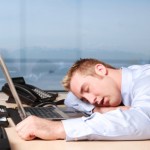 Sleep deprivation is a widely established problem across society with around 70% of Americans reporting that they get insufficient sleep at least once per month. While a power nap during the day has commonly been prescribed as a solution, research from Michigan State University suggests this is not enough to compensate for a sleepless night.
Sleep deprivation is a widely established problem across society with around 70% of Americans reporting that they get insufficient sleep at least once per month. While a power nap during the day has commonly been prescribed as a solution, research from Michigan State University suggests this is not enough to compensate for a sleepless night.
“We are interested in understanding cognitive deficits associated with sleep deprivation. In this study, we wanted to know if a short nap during the deprivation period would mitigate these deficits,” the researchers say. “We found that short naps of 30 or 60 minutes did not show any measurable effects.”
Central to the restorative power of any sleep we enjoy is the amount of slow-wave sleep contained within it. It’s slow-wave sleep (SWS) that helps us to restore our energies and is marked by high amplitude, low frequency brain waves. It’s the stage in which our body is most relaxed and our muscles are at ease.
“SWS is the most important stage of sleep,” the researchers say. “When someone goes without sleep for a period of time, even just during the day, they build up a need for sleep; in particular, they build up a need for SWS. When individuals go to sleep each night, they will soon enter into SWS and spend a substantial amount of time in this stage.”
Restorative sleep
Volunteers were asked to complete various cognitive tasks upon arrival at a Sleep Lab. They were then assigned to one of three groups, the first of which saw them sent home to sleep, the second which saw them stay in the lab overnight and take either a 30 minute or 60-minute nap with no longer sleep allowed, while the final group took no naps and just went without sleep.
In the morning, each volunteer reconvened in the lab to try and complete the cognitive tasks again. The tasks were designed to measure attention and peacekeeping, which is the ability to complete a series of steps in the right order, even when one is interrupted.
“The group that stayed overnight and took short naps still suffered from the effects of sleep deprivation and made significantly more errors on the tasks than their counterparts who went home and obtained a full night of sleep,” the researchers say. “However, every 10-minute increase in SWS reduced errors after interruptions by about 4%.”
While this decline may seem small, when we consider the kind of people who might likely suffer from sleep deprivation, such as doctors, nurses, truck drivers, and so on, a 4% decrease in their capability could have significant, life-changing consequences.
“Individuals who obtained more SWS tended to show reduced errors on both tasks. However, they still showed worse performance than the participants who slept,” the researchers conclude.